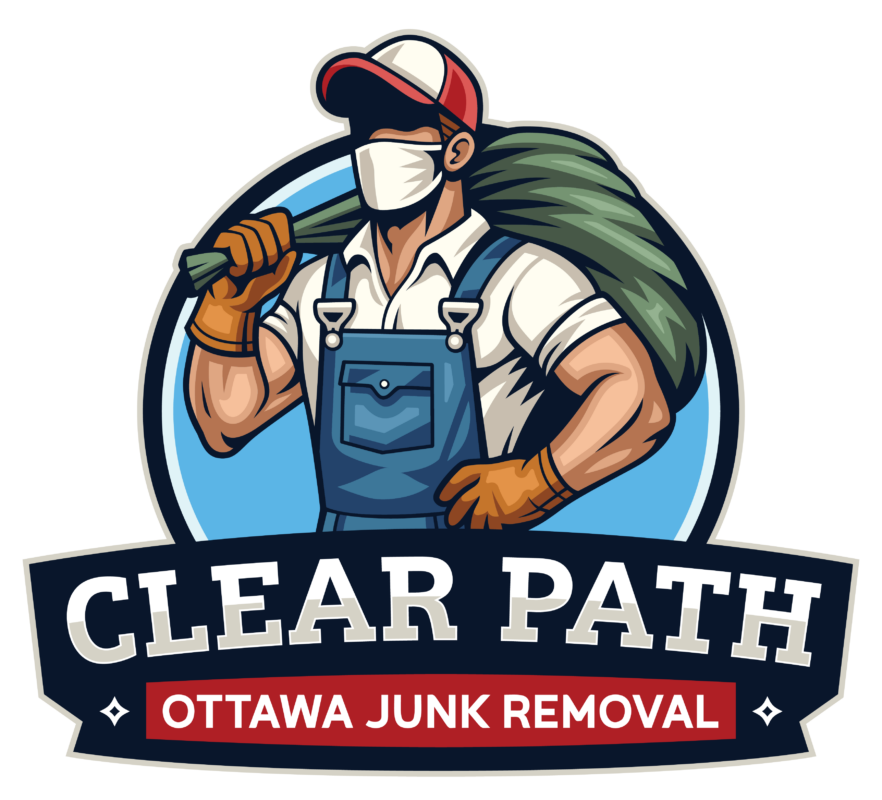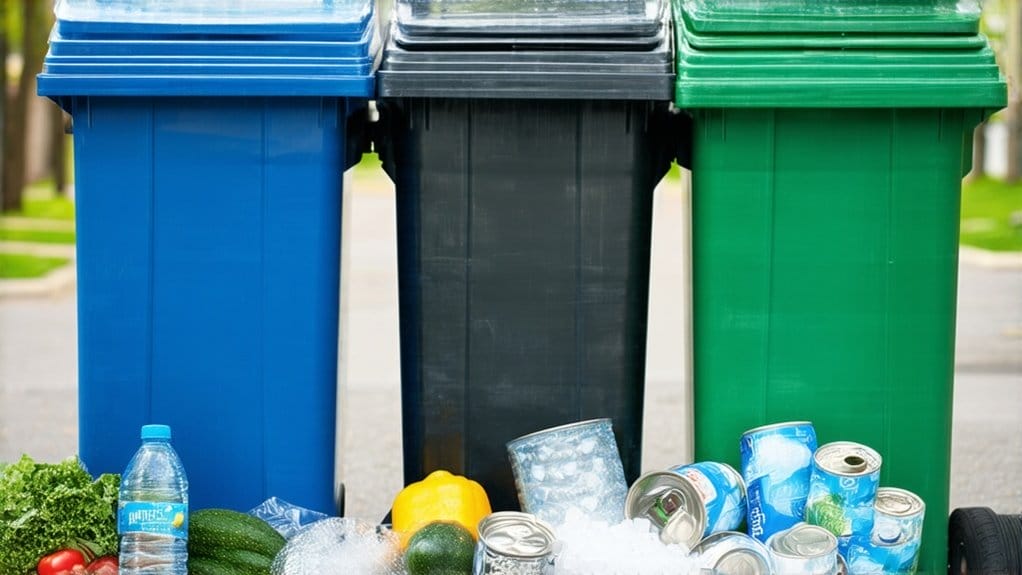A small recycling bin in your Ottawa home can be a symbol of your commitment to the city's sustainability efforts. As you sort your waste, you're likely to wonder what can and can't go into each bin. You put glass, metal, and plastics with recycling symbols in the Blue Bin, and paper products in the Black Bin. Meanwhile, food scraps and yard waste go into the Green Bin. But what about items like dirty containers, food-soiled paper, or non-biodegradable materials? The fate of Ottawa's recycling program rests on the correct answers to these questions.
Blue Bin Acceptable Materials
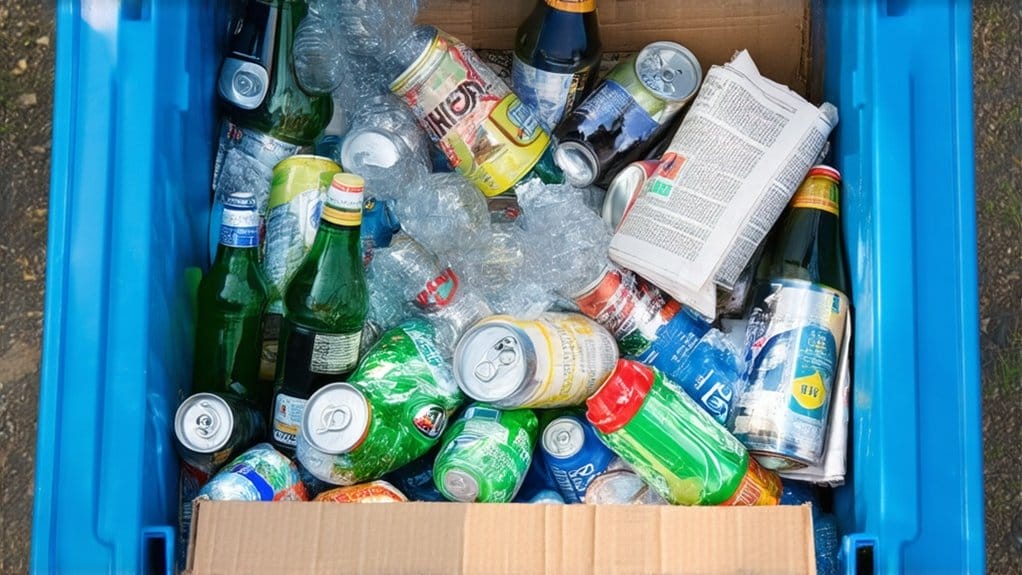
When it comes to Ottawa's blue bin recycling program, knowing what materials are accepted is key to effective participation. You can recycle various glass and metal items, such as glass bottles and jars, metal cans, and aluminum containers. Make certain to empty paint cans and remove their lids before recycling them. You can also recycle spiral-wound canisters with metal ends and clean foil.
In addition to glass and metal, you can recycle paper products like newspaper, flyers, magazines, and catalogues. Corrugated cardboard, cartons, and Tetra Paks are also accepted.
When it comes to plastics, you can recycle plastic bottles, jars, jugs, tubs, and tub lids. Milk and juice cartons are also accepted, as well as clean plastic containers with recycling symbols.
Remember to empty and rinse all items before recycling them. Don't include plastic bags or packaging, and avoid soiled or contaminated items. Check for recycling symbols and follow city guidelines to guarantee you're recycling correctly. Organic waste, including food scraps, belongs in the green bin instead.
Finally, make sure the weight of your blue bin doesn't exceed 15 kg when full. By following these guidelines, you'll be able to participate effectively in Ottawa's blue bin recycling program.
Black Bin Acceptable Materials
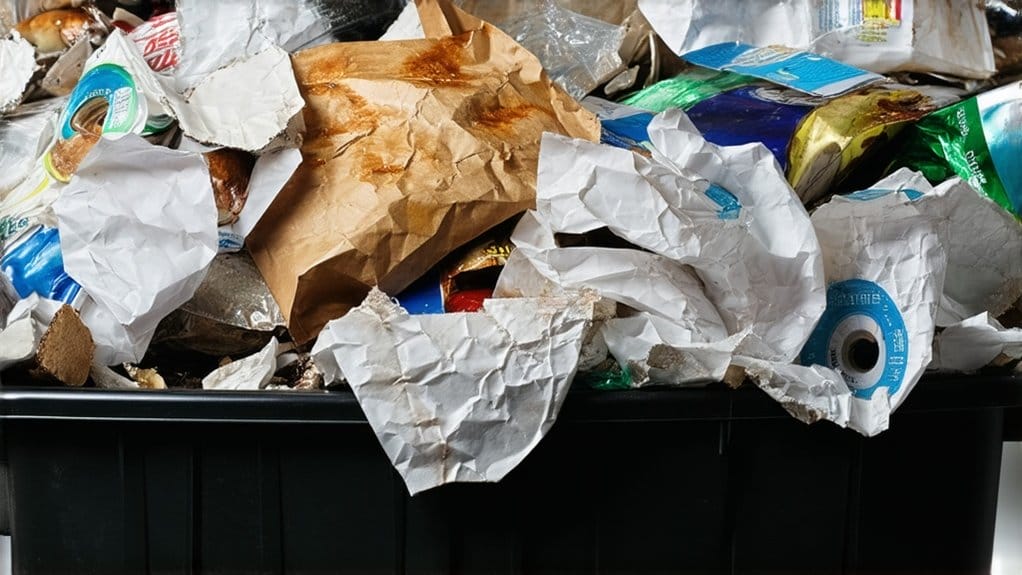
Now that you're familiar with what can be recycled in Ottawa's blue bins, it's time to look at the city's guidelines for the black bin program.
The black bin is designated for paper and cardboard products. You can dispose of newspaper, flyers, magazines, catalogues, and corrugated cardboard in your black bin. Cereal and cracker boxes are also acceptable, but make certain to remove any plastic liners.
Additionally, you can include shoe and laundry detergent boxes, writing and computer paper, paper egg cartons, toilet paper rolls, and paper towel rolls. These items can be utilized in various DIY projects, enabling you to unleash your creativity while contributing to a more sustainable lifestyle. From organizing your home to creating unique decor pieces, thinking outside the box can lead to impressive home design ideas and inspiration. By repurposing these everyday materials, you not only reduce waste but also add a personal touch to your living space.
Gift wrapping paper, greeting cards, and clean paper shopping bags or paper packaging are also allowed. Frozen dinner boxes, clean pizza boxes, and paper-based stationery, such as notebooks and calendars, are acceptable.
However, you must confirm that these items are free of contaminants like food residue, wax, or foil. It's important to note that plastic bags, liners, and soiled paper or cardboard aren't accepted in the black bin. As of July 1, books are no longer accepted in the black bin.
Green Bin Acceptable Materials
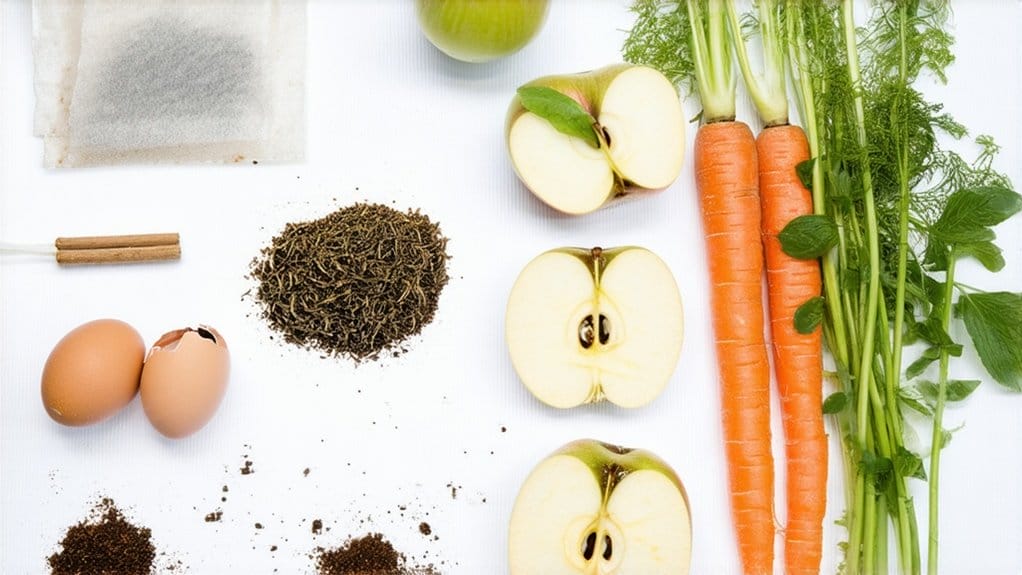
Ottawa's green bin program is designed to collect organic waste, which is then converted into nutrient-rich compost.
You can put various organic materials in your green bin, including food waste and yard trimmings. For food waste, you can add fruits and vegetables, meat, fish, and poultry, as well as dairy products like cheese, eggs, and eggshells. You can also include baking ingredients, herbs, and spices, along with leftover cooking oils and fats.
In addition to food waste, you can also put yard waste in your green bin. This includes branches, twigs, and hedge trimmings under 10 cm in diameter, leaves, plants, weeds, and grass clippings. Small household plants, including soil, are also accepted.
Other acceptable materials include food-soiled paper products like paper towels, napkins, and tissues, as well as soiled pizza boxes and paper coffee cups. You can also add household floor sweepings, vacuum bags, and vacuum contents to your green bin.
Generally, the compost is then processed to produce nutrient-rich fertilizers and help reduce greenhouse gas emissions. Make sure to only include acceptable materials in your green bin, as non-acceptable materials can contaminate the compost. By following these guidelines, you can help create nutrient-rich compost and reduce waste in Ottawa's landfills.
Blue Bin Non-Acceptable Materials
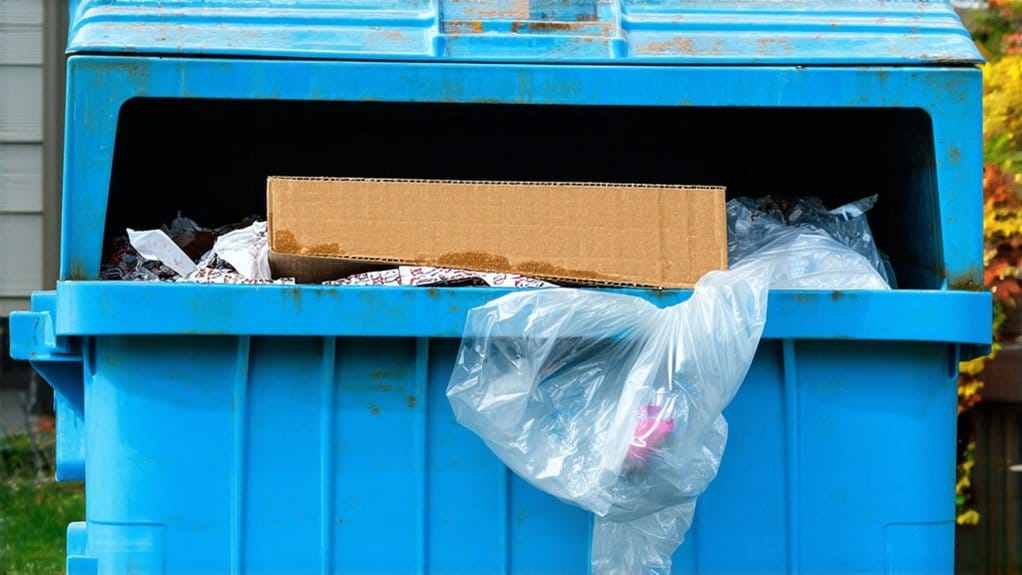
While helping to create nutrient-rich compost through Ottawa's green bin program, it's equally important to ascertain the materials you put in your blue bin are accepted.
You can't recycle black plastic, compostable and biodegradable items, plastic packaging, Styrofoam pieces smaller than 10 cm x 10 cm, and medical waste in your blue bin. These items contaminate recyclables and damage equipment at recycling facilities.
You must also exclude paper lined with plastic, shredded paper in non-clear bags, and small paper pieces not in an envelope or clear bag.
Newspaper and magazine overwrap must be separated from the plastic bags and overwrap before recycling.
Don't put food residue, food-soaked paper, contaminated containers, or organic waste in your blue bin. These items belong in the green bin.
Clothing and textiles, electronic waste, household hazardous waste, and items causing sorting issues are also not accepted in the blue bin.
Make sure to check the recycling symbols on your items, as not all items with these symbols are accepted in Ottawa's blue bin program.
In Ontario, all municipalities are required to have transitioned to the Extended Producer Responsibility framework by December 31, 2025.
Black Bin Non-Acceptable Materials
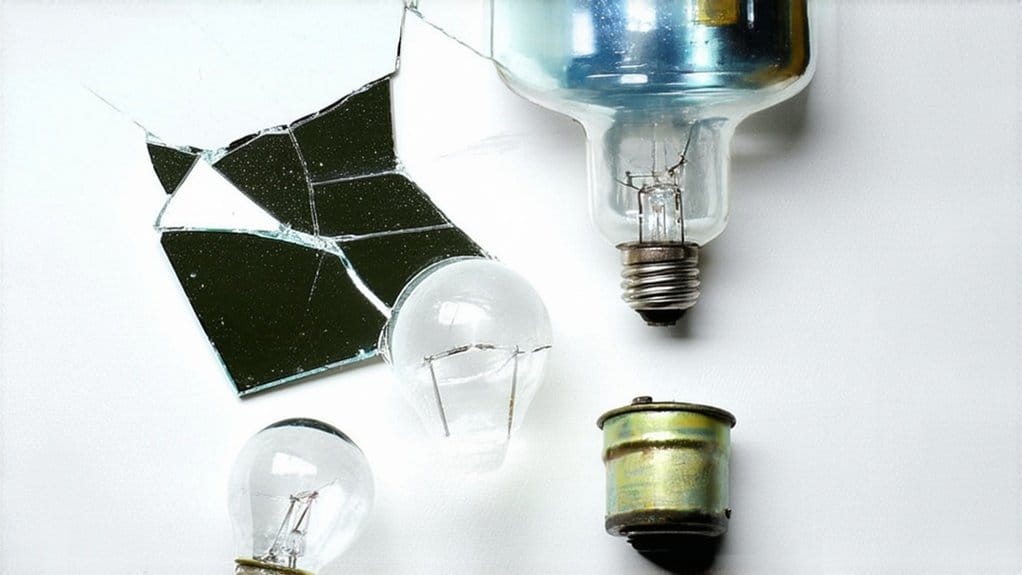
Beyond adhering to the guidelines for your blue bin and contributing to nutrient-rich compost through Ottawa's green bin program, you must also follow specific regulations for your black bin.
You can't dispose of books, including hard and soft cover ones, in your black bin as of July 1, 2023. Plastic bags or film, waxed paper, soiled paper products, and food-soiled pizza boxes are also non-acceptable materials.
You must sort out electronics and electrical waste, hazardous and special waste, batteries, tires, and non-paper or cardboard materials from your black bin. Additionally, exclude plastic packaging, foil wrapping paper, bows and ribbons, paper and cardboard lined with foil, and fast food drink cups made of plastic.
Only clean paper products are accepted in the black bin. Ascertain the black bin doesn't weigh more than 15 kg when full. The average Canadian recycles over 112 kg annually, and adhering to these guidelines helps improve Ottawa's recycling statistics.
Common Sorting Mistakes
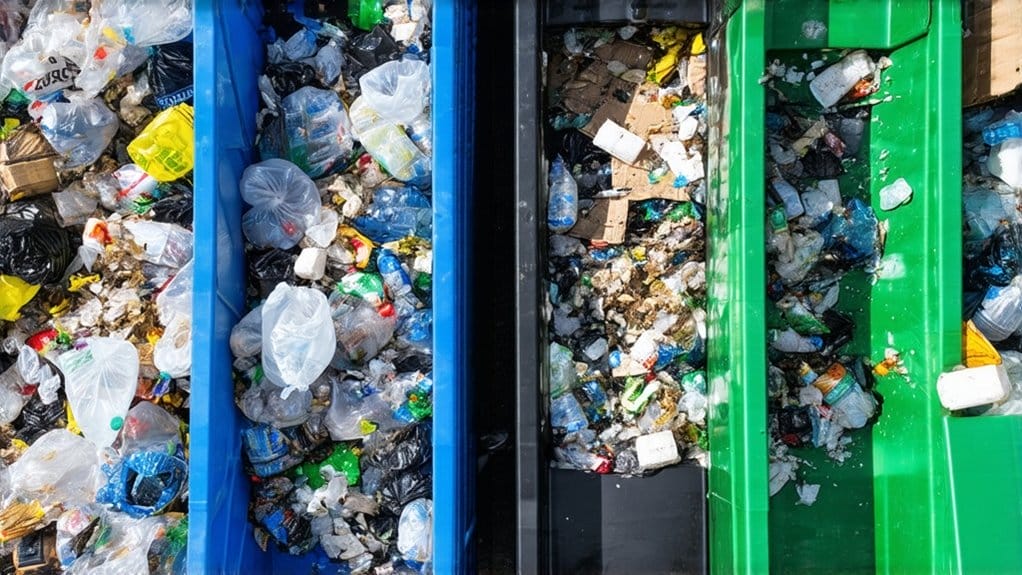
Mistakes in sorting household waste can have significant consequences on the efficiency and effectiveness of waste management programs. When you don't sort your waste correctly, you risk contaminating entire batches of recyclables. For instance, unwashed containers, black plastic, and textiles can all cause problems in the recycling stream. Similarly, failure to separate different types of plastic lids can ruin a whole batch.
In addition to contamination risks, you should also be aware of common sorting mistakes. In the green bin, you should include dirty paper, food waste, coated or greasy paper, and waxy cardboard.
Meanwhile, household hazardous waste, electronics, and batteries should never go in regular bins. Multi-material packaging, like padded envelopes and blister packs, can't be recycled. Plastic wrap and mixed material items, such as pet food bags with foil and plastic, are also not accepted.
General Recycling Guidelines
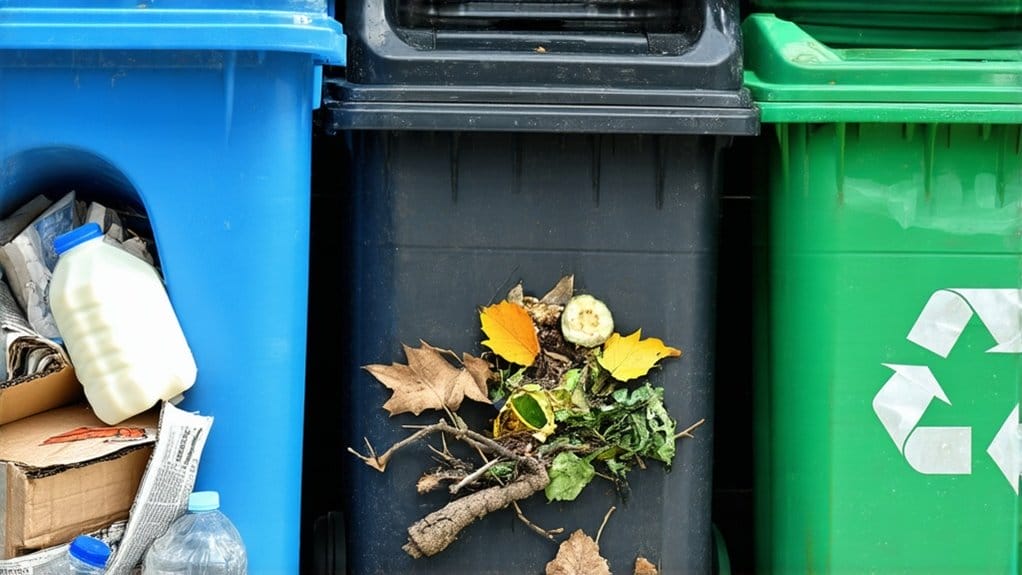
Diving into the specifics of Ottawa's waste management programs, you'll need to understand what can and can't be recycled in each bin.
Start by familiarizing yourself with the blue bin, where you can recycle newspaper and flyers, magazines and catalogs, corrugated cardboard, plastic containers with a recycling triangle, and aluminum drink cans.
However, you can't include glass items like drinking glasses and windows, aerosol cans, Styrofoam containers and packaging, plastic bags, or bakery and produce plastics.
The black bin also accepts newspaper and flyers, magazines and catalogs, and corrugated cardboard. Additionally, you can recycle hard and soft cover books, paper egg cartons, and toilet paper rolls.
Meanwhile, the green bin is for food-soiled paper towels, napkins, and tissues, food-soiled pizza boxes, household plants with soil, kitty litter, and soiled paper, boxboard, and cardboard.
To guarantee efficient recycling, it's essential to follow these guidelines carefully.
Sorting your waste correctly helps Ottawa's waste management system function smoothly.
By knowing what can and can't be recycled in each bin, you contribute to the success of Ottawa's recycling programs and help maintain a sustainable environment.
Accurate sorting is key to minimizing waste and maximizing recyclables.
Conclusion
Mastering Ottawa's recycling system is key to a greener future. You're now equipped to sort items into the Blue, Black, and Green bins like a pro. Remember, recycling is like conducting an orchestra: every item must be in its right place to create harmony. By following the guidelines, you'll help reduce waste and create a symphony of sustainability in your community. Keep recycling, and let's make Ottawa a more eco-friendly city, one bin at a time.
